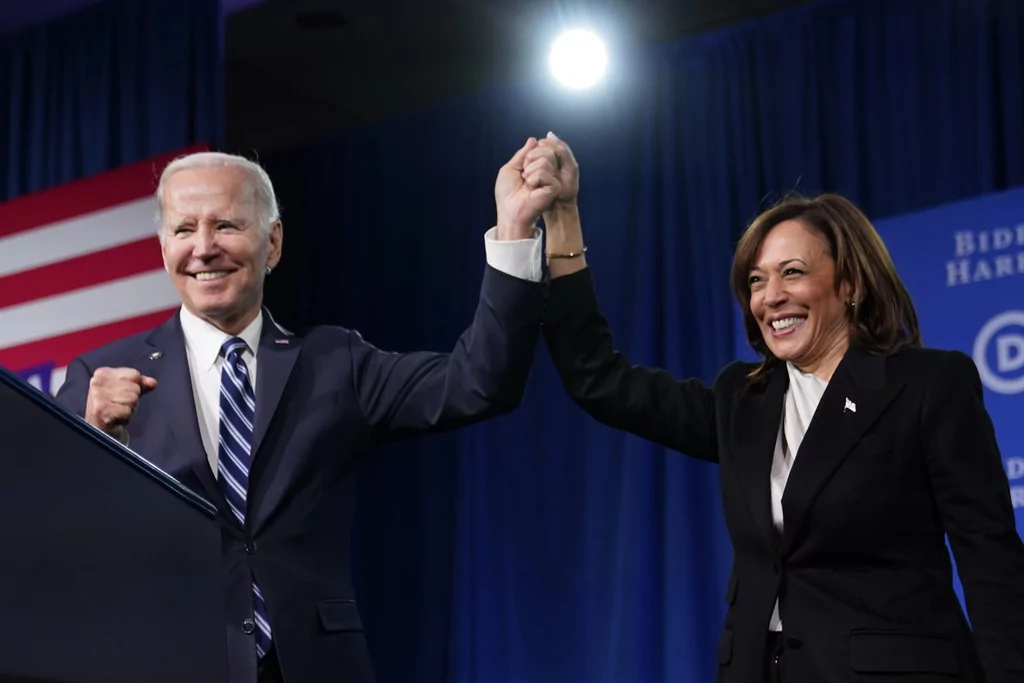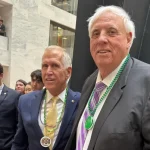

Since President Joe Biden passed the torch to Vice President Kamala Harris a week ago, she has balanced how closely she should cling to her boss, who has historically low public approval.
A namesake of the “Biden-Harris administration,” as the White House has long dubbed the duo, Harris so far has not given any indication she will stray too far from Biden on policy.
However, the former senator and California attorney general has tried to break from Biden stylistically with a reboot of her image as a tough former prosecutor and a TikTok star.
That freshness has helped her in the last week to galvanize the Democratic donor base and party leaders around her quick candidacy. She’s hoping to ride that wave to the Democratic National Convention next month in Chicago — backed by the same staffers and campaign infrastructure as Biden.
Harris has carved out different policy goals from Biden and other Democrats in the past, and she may choose to do so again once her campaign gets moving in earnest. It has been less than a week since Biden abruptly dropped out of the race Sunday afternoon.
A hint of their different approaches could be seen after both Biden and Harris met with Israeli Prime Minister Benjamin Netanyahu on Thursday. The two gave broadly similar messages, but Harris was much more forceful about pushing back against Israel’s execution of its campaign in Gaza.
“We cannot allow ourselves to be numb to the suffering, and I will not be silent,” Harris said Thursday to White House reporters. Harris called her talk with Netanyahu “frank” and pledged not to not to “look away in the face of these tragedies.”
On Friday, former President Donald Trump hit back at Harris during his own meeting with Netanyahu at Mar-a-Lago: “She was certainly disrespectful to Israel in my opinion,” Trump said, adding that he doesn’t know how anyone who is Jewish could vote for Harris.
In her domestic policy speeches so far, she is hemming close to her boss.
“We who believe in the freedom to vote will pass the John Lewis Voting Rights Advancement Act and the Freedom to Vote Act,” Harris said in a speech at a teachers union convention in Houston. “We who believe in the freedom to live safe from gun violence will pass an ‘assault weapons’ ban. We who believe that every American should be free from bigotry and hate will fight to protect our teachers and our students from discrimination.”
Harris also spoke of student loan forgiveness and reproductive rights, policy positions that could easily have emerged from the mouth of Biden, if perhaps with slightly different wording.
For now, her difference in approach may be Harris’s biggest break with Biden on the campaign trail. Her background and demographic profile also could make her message carry differently than Biden on some topics.
Harris is leaning on her prosecutor background to paint the race against Trump, the GOP presidential nominee, as being “prosecutor versus felon,” even if Biden was already making Trump’s New York felonies an issue. Similarly, as a woman, Harris may be able to campaign more directly on abortion than Biden.
Those differences may prove detrimental in other areas, however. Both the Biden/Harris and Trump campaigns desperately want to win the swing states of Pennsylvania, Michigan, and Wisconsin, and Harris, a native Californian, will not be able to draw on “Scranton Joe” stories to try and connect with them.
The Trump campaign, for its part, says that it doesn’t expect Harris to be much different than her predecessor when it comes to policy.
“Kamala Harris is just as weak, failed, and incompetent as Joe Biden — and she’s also dangerously liberal,” Trump spokeswoman Karoline Leavitt said. “Not only does Kamala need to defend her support of Joe Biden’s failed agenda over the past four years, she also needs to answer for her own terrible weak-on-crime record in California. A vote for Kamala is a vote for more crime, inflation, open borders, high gas prices, and war around the world, and our team will make sure every American knows it.”
Trump himself said earlier this week he expects debating Harris to be similar to Biden because of their shared outlook on governance, though it appears the debate is now on ice.
“I agreed to a debate with Joe Biden, but I want to debate her,” Trump said on a call with reporters. “She’ll be no different because they have the same policies.”
Harris and Biden, however, did spell out their policy differences ahead of the 2020 Democratic primaries as they were each jockeying for position in intraparty debates.
Harris co-sponsored the Green New Deal as a senator and said she supported a ban on fracking while running for president, both positions that Biden distanced himself from. Several green groups have come out in support of Biden’s decision to drop out of the race this week, including Evergreen Action, the League of Conservation Voters, and the Environmental Defense Fund.
If elected, she may seek to move beyond Biden in some areas. Axios reported that Harris wants to push a nearly $2 trillion pre-K, child care, and elder care program and wants to raise the corporate tax rate back to 35%, whereas Biden was pushing only for 28%.
CLICK HERE TO READ MORE FROM THE WASHINGTON EXAMINER
But since taking office, Harris has almost entirely fallen in line with the Biden administration’s policies. When asked if Biden would be OK with Harris carving out her own policy agenda, White House press secretary Karine Jean-Pierre pointed to their record working together.
“The last four years has been very successful, policy-wise,” she said. “They’ve been able to get things done.”






